- News
- Reviews
- Bikes
- Accessories
- Accessories - misc
- Computer mounts
- Bags
- Bar ends
- Bike bags & cases
- Bottle cages
- Bottles
- Cameras
- Car racks
- Child seats
- Computers
- Glasses
- GPS units
- Helmets
- Lights - front
- Lights - rear
- Lights - sets
- Locks
- Mirrors
- Mudguards
- Racks
- Pumps & CO2 inflators
- Puncture kits
- Reflectives
- Smart watches
- Stands and racks
- Trailers
- Clothing
- Components
- Bar tape & grips
- Bottom brackets
- Brake & gear cables
- Brake & STI levers
- Brake pads & spares
- Brakes
- Cassettes & freewheels
- Chains
- Chainsets & chainrings
- Derailleurs - front
- Derailleurs - rear
- Forks
- Gear levers & shifters
- Groupsets
- Handlebars & extensions
- Headsets
- Hubs
- Inner tubes
- Pedals
- Quick releases & skewers
- Saddles
- Seatposts
- Stems
- Wheels
- Tyres
- Health, fitness and nutrition
- Tools and workshop
- Miscellaneous
- Tubeless valves
- Buyers Guides
- Features
- Forum
- Recommends
- Podcast
review
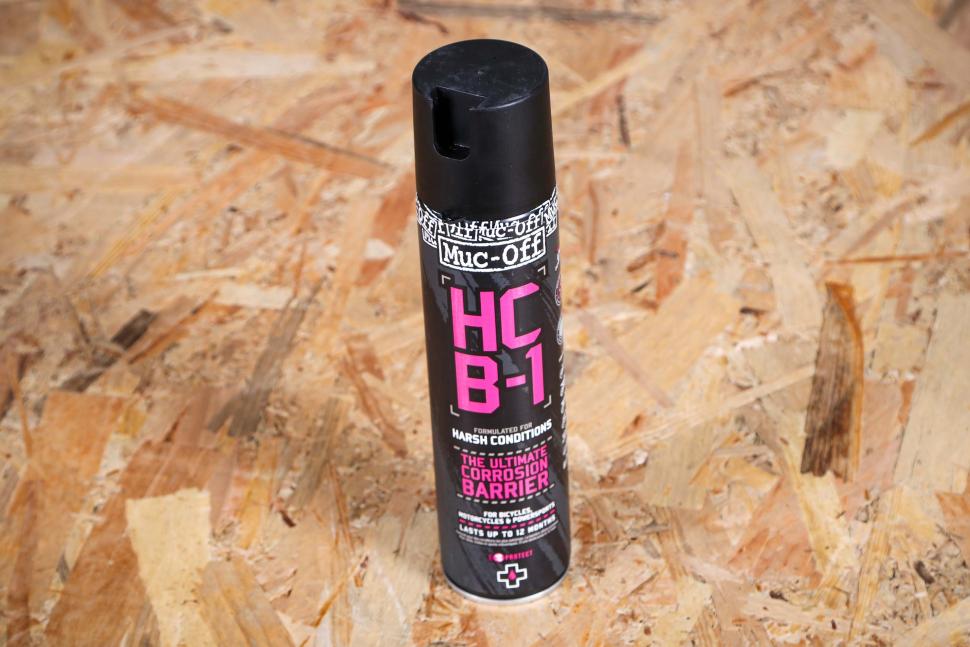 2023 Muc-Off HCB-1 - 400ml
2023 Muc-Off HCB-1 - 400ml£16.00
VERDICT:
Versatile and seemingly effective corrosion-inhibitor that lends itself well to cycling contexts
Seemingly durable
Versatile
Good coverage
Quite long curing times
Can attract dirt if not carefully applied
Weight:
401g
Contact:
At road.cc every product is thoroughly tested for as long as it takes to get a proper insight into how well it works. Our reviewers are experienced cyclists that we trust to be objective. While we strive to ensure that opinions expressed are backed up by facts, reviews are by their nature an informed opinion, not a definitive verdict. We don't intentionally try to break anything (except locks) but we do try to look for weak points in any design. The overall score is not just an average of the other scores: it reflects both a product's function and value – with value determined by how a product compares with items of similar spec, quality, and price.
What the road.cc scores meanGood scores are more common than bad, because fortunately good products are more common than bad.
- Exceptional
- Excellent
- Very Good
- Good
- Quite good
- Average
- Not so good
- Poor
- Bad
- Appalling
Muc-Off HCB-1 – which stands for Harsh Corrosion Barrier – is a protectant spray designed to defend against corrosion in harsh conditions and last up to 12 months. It's not cycling specific, but is blended for modern materials and components. Technique and preparation are key to getting the best from it, and though it's early days, I'm forming the opinion that it's a great fit for bikes serving long periods on indoor trainers, those in long-term storage and pretty winter/working builds.
I'm told HCB-1 is a 'synthetic based active', a carefully formulated blend of mineral oils and solvents, providing rust inhibition, rust prevention, corrosion resistance, humidity resistance and salt spray resistance.
It's brewed with carbon fibre and electricals in mind, and it reacts to UV light, which might sound like a gimmick but ensures you can see that you've achieved full and even coverage.
Use it in well-ventilated areas away from sources of ignition, and store in cool, dry spaces and away from curious hands and paws.
Application
For best results, give your bike a good wash, and dry thoroughly. Give the aerosol a vigorous 30-second shake, and apply a thin layer from 30cm.
The aerosol is supplied with a straw for very localised delivery (though ours went walkabout). This avoids wastage and minimises overspray, so you'll stand a sporting chance of avoiding braking surfaces, tyres and other things you don't want getting sticky.
Wipe away any excess, or expect a gungy, grime-attracting beard. I know of someone who went to town around his BMW touring motorcycle only to discover things quickly turned gooey and filthy.
Ideally, leave 24 hours to cure, although in a dry workshop I've found it's cured to the faintly tacky state in around 12-14 hours.
Performance
I've used HCB-1 to treat framesets, touring trailers (internally), nickel-plated pedal bodies, hub spacers and locknuts, not to mention workshop stuff such as derailleur hanger alignment tools, the sort that seem to develop a reddish taint even in a dry, secure workshop.
I've also treated the sills and crevices of my elderly but very solid cars, and it certainly seems to work. Early days, but unpainted areas – cantilever posts, chrome-plated cable hangers, frame ends and tooling – remain taint free. It has also done a decent job of arresting any existing taint.
As an example, though generally blemish free, the axle on my tourer's Shimano Deore crankset can hold traces of water, and given a couple of weeks' exposure to mucky roads, it will cultivate an annoying, localised orange taint. The same applies to the derailleur spring on a Tiagra rear mech. All stopped in their tracks.
Ditto some mudguard chainstay bridge fasteners and that frame hanger alignment tool.
Elsewhere, cantilever posts stay unblemished, headsets, quill stems and fluted seatposts on a friend's turbo 'slave' bike remain mobile and corrosion free.
And topping up has been unnecessary, so far.
The cars' sills follow this narrative. I was a little more liberal here, given their exposure to wet roads.
In terms of attracting grime, it's moderate and in some instances serves as a welcome mothballing: after ten days spent traversing very wet lanes on my rough stuff tourer, some obvious gunge had developed but it's localised and doing a good job of sealing out the elements, so it stays. Elsewhere, I've been particular about wiping away excess. Should you wish to strip the HCB-1 completely, the most effective way is by basting the area with bike wash concentrate/degreaser, working this into a lather and rinsing with warm water.
Aside from the cars, in terms of coverage I have treated three framesets and a trailer, mothballed three sets of cantilever posts, cable guides (where ferrules sit), assorted fasteners, two HollowTech II axles and three rims, and I still have half the aerosol remaining.
Value
At £16 for 400ml this is quite an investment, but though there are cheaper options they are possibly less durable.
Probably the closest like-for-like comparator, and one I've used on cars, motorcycles and bicycles, is ACF-50. At £8.06 for 13oz (370ml), it's considerably cheaper than the Muc-Off. It's claimed to be active for 12 months, but though I've found it effective, I've needed to top it up every three to six months, especially during the darker months.
Motorex Moto Protect is another protectant spray designed for bicycles, motorcycles and longer-term storage, and is apparently safe on carbon fibre. It's £13 for 500ml, which is slightly cheaper, but I haven't used it so it's difficult to make useful comparison. Motorex also makes Bike Protect Bio, which costs £11.99 for 300ml. Again, it's not one I've used.
Boeshield T-9 Rust & Corrosion Protection/Inhibitor and Waterproof Lubrication is more expensive, £24.95 for 12oz (340ml), and is designed for marine, aerospace and other applications, including bicycles, but it needs to be applied every few months.
Conclusion
Muc-Off HCB-1 is shaping up as a durable and effective means of protecting bikes, framesets, components and tooling from corrosion. Getting the best from it requires a little bit of forethought, but with the correct technique a little seems to go a long way. There are cheaper means of 'mothballing', but in my experience they can require more frequent (or more liberal) application, and some, especially those containing PTFE, are not particularly kind to seals and other more delicate components.
Verdict
Versatile and seemingly effective corrosion-inhibitor that lends itself well to cycling contexts
road.cc test report
Make and model: Muc-Off HCB-1
Size tested: 400ml
Tell us what the product is for and who it's aimed at. What do the manufacturers say about it? How does that compare to your own feelings about it?
Muc-Off says: "Keep your precious steed in tip-top condition with the Muc-Off Harsh Condition Barrier. With a state-of-the-art thin film coating, it'll make light work of rust and corrosion. It's the perfect upgrade for winter months, or to keep your bike looking fresh all year long – as you'll have 12 months of protection.
This innovative product is a must-have. It'll keep moisture out, creating a durable anticorrosive layer of protection on your bike's frame, chain, metal parts, plastics and paintwork. And on parts that have already got some rust showing, it'll get rid of it altogether.
To make it super easy to check that you're protected, we've added a UV dye. With a UV light you can check it's correctly in place and ready to protect your bicycle, e-bike or motorcycle. So you can get out there and enjoy the ride, no matter what the weather."
It's a versatile and seemingly durable corrosion-inhibitor that is fairly economical to apply, and particularly suited to bikes in longer-term/seasonal storage or serving on indoor trainers.
Tell us some more about the technical aspects of the product?
I'm told its a blend of mineral oils and solvents.
Muc-Off lists these features:
Quick and easy to apply
Dissolves existing rust
300+ hours salt spray to ASTM B-117
Thin transparent film
Strong capillary action allows the product to get into tight cracks and crevices
Contains UV application dye to ensure complete protection
Resistant to hot, cold and salt-water
Ideal for use in harsh environments
Creates a self-healing barrier, active for up to 12 months
Safe to use on electrical components, paintwork and most rigid plastic trim
Contains no wax silicon, Teflon or water
Perfect for bicycles, e-bikes and motorcycles
Rate the product for performance:
8/10
Flows nicely and cures to form a slightly tacky protectant barrier. Easy to apply. Difficult to comment upon its long-term corrosion-inhibiting prowess, but to date has stayed put despite continuous exposure to waterlogged, silty roads and lanes, and has stopped any minor corrosion in its tracks. For best results, allow 24 hours curing time before use. It seems kind to carbon, composite, and rubberised surfaces/components, including seals.
Disposable gloves are a wise move if you have sensitive skin or are using for prolonged periods, and use in a well-ventilated area.
Rate the product for durability:
8/10
Muc-Off reckons that once cured, the barrier will last 12 months. Difficult to assess these claims at this stage. However, to date, it's held out very well, including in some very wintry, early-season contexts.
It can be removed, but required a generous helping of concentrate degreaser, lots of lathering, scrubbing, and rinsing with a soft brush.
Rate the product for value:
6/10
Not cheap, but others aren't claimed to last as long (and some cost more in the first place).
Tell us how the product performed overall when used for its designed purpose
It's easy to use and very versatile. A light coating doesn't attract much grime, despite continual exposure to wet, gritty roads, and recipient surfaces don't need to be spotless – the odd bit of grime doesn't seem to present any issues with adhesion or effectiveness. It has arrested some annoying corrosion on hub spacers, car engine bays, electroplated tools, track nuts and crank axles, and slightly oxidised 7005 and 6061 aluminium alloy frame/fork ends. I have treated three frames internally, spoke holes and heads beneath rim tape, three car door sills, sections of engine bay and tooling, and mothballed other framesets, with half the can.
Tell us what you particularly liked about the product
Convenient to apply, economical and, to date, very effective.
Tell us what you particularly disliked about the product
Nothing really, although it takes a while to cure.
How does the price compare to that of similar products in the market, including ones recently tested on road.cc?
At £8.06 for 13oz (370ml), ACF-50 is considerably cheaper than the Muc-Off. It's claimed to be active for 12 months, but though I've found it effective, I've needed to top it up every three to six months, especially during the darker months.
Motorex Moto Protect is another protectant spray designed for bicycles, motorcycles and longer-term storage, and is apparently safe on carbon fibre. It's £13 for 500ml, which is slightly cheaper, but I haven't used it so it's difficult to make useful comparison. Motorex also makes Bike Protect Bio, for £11.99 for 300ml. Again, it's not one I've used.
Boeshield T-9 Rust & Corrosion Protection/Inhibitor and Waterproof Lubrication, designed for marine, aerospace and other applications including bicycles, is more expensive, £24.95 for 12oz (340ml), and needs to be applied every few months.
Did you enjoy using the product? Yes
Would you consider buying the product? Yes
Would you recommend the product to a friend? Yes
Use this box to explain your overall score
It's difficult to make anything other than tentative conclusions regarding durability, a month or so down the line, but so far I'm impressed by the HCB-1's performance and economy.
About the tester
Age: 49
I usually ride: Rough Stuff Tourer Based around 4130 Univega mtb Frameset My best bike is: 1955 Holdsworth Road Path and several others including cross & traditional road
I've been riding for: Over 20 years I ride: Most days I would class myself as: Experienced
I regularly do the following types of riding: cyclo cross, commuting, touring, fixed/singlespeed, mtb,
Shaun Audane is a freelance writer/product tester with over twenty-eight years riding experience, the last twelve (120,000 miles) spent putting bikes and kit through their paces for a variety of publications. Previous generations of his family worked at manufacturing's sharp end, thus Shaun can weld, has a sound understanding of frame building practice and a preference for steel or titanium framesets.
Citing Richard Ballantine and an Au pair as his earliest cycling influences, he is presently writing a cycling book with particular focus upon women, families and disabled audiences (Having been a registered care manager and coached children at Herne Hill Velodrome in earlier careers)
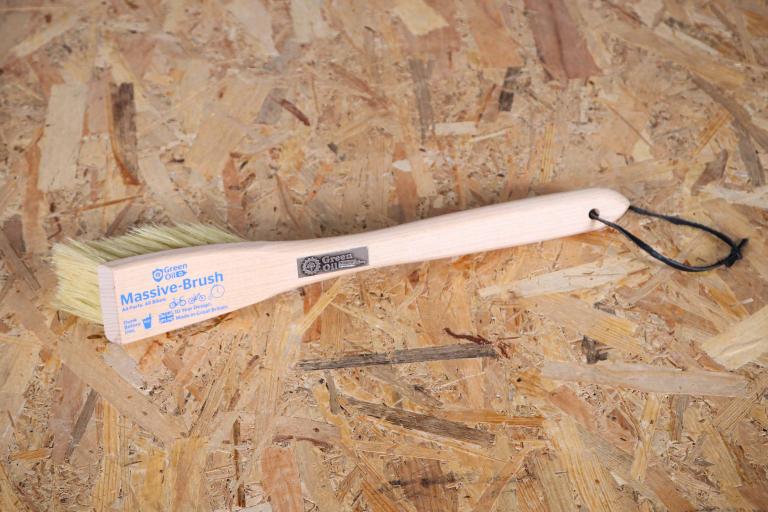
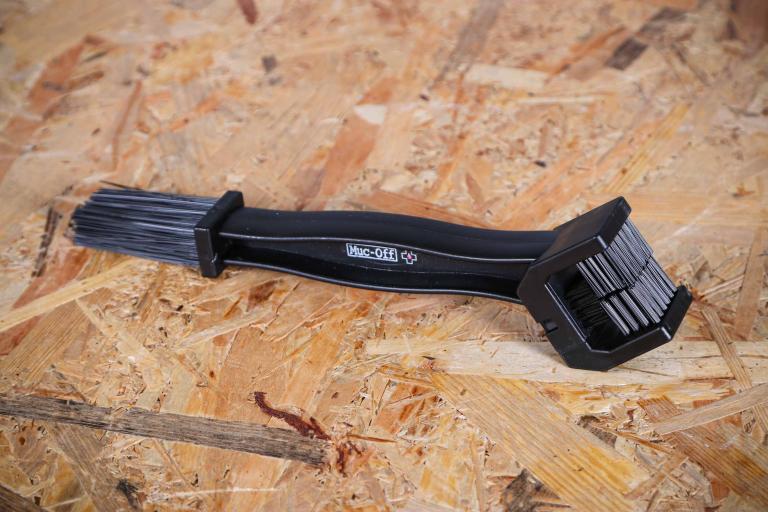
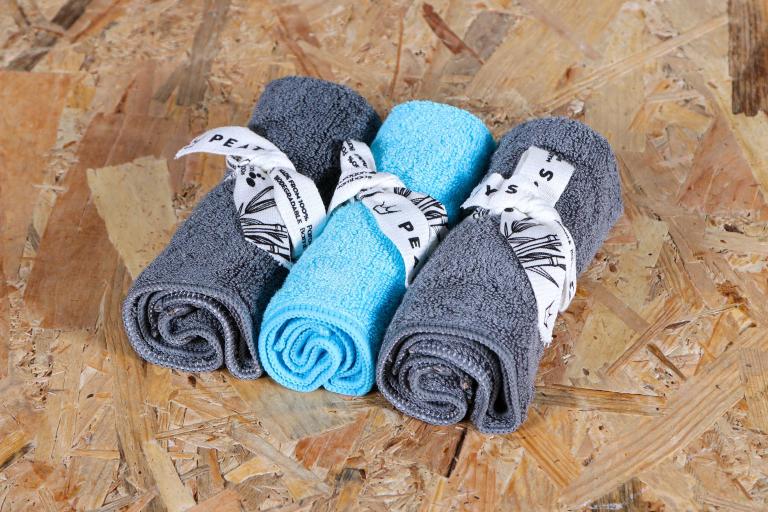
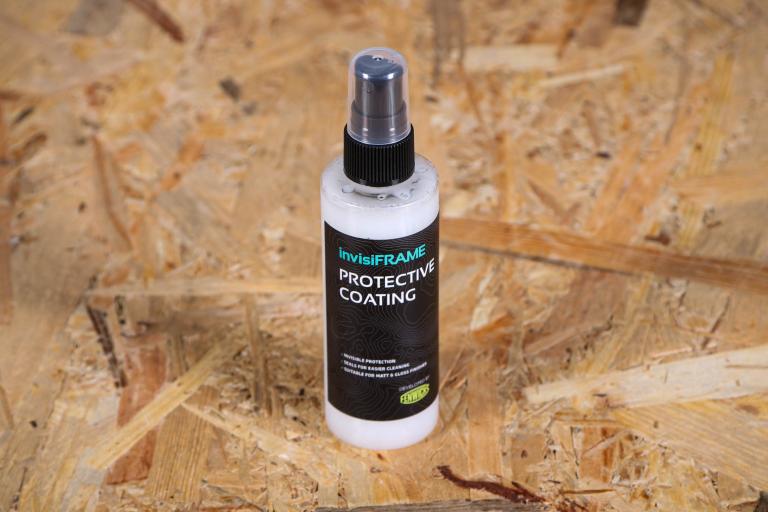
You could choose a UK or EU brand who manufactures in Taiwan or SE Asia via a non-Chinese owned factory, if you wanted to base a purchase on that....
I'm curious how long did it last, I doubt the battery survived all these years?...
Not as much hate as when Adrian Chiles recently went electric. But I guess Dylan was doing his job well.
Look Teflon was the original trade name for PTFE itself, that's just a historical fact. ...
Legally, they are all "independent schools"
Thanks!...
Gridlock across Canterbury as multiple roadworks to take place across city...
Obvious I suppose but worth saying for newcomers: if you want to try out shoes without too much outlay have a look around the sales, there are some...
I think with electric vehicles - hire bikes, hire scooters, illegal privately owned scooters - the problem is that many of the people using them...
In her statement to Parliament about her visit to China, Rachel Reeves specifically named Brompton as a company who would benefit.